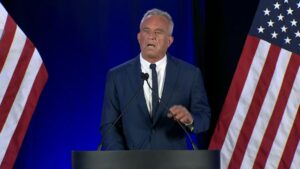Rallies Held Across US for ‘Climate, Care, Jobs, and Justice’
Scores of people in communities around the United States took to the streets on Saturday to demand swift and bold legislative and executive action to tackle the fossil fuel-driven climate crisis as well as skyrocketing inequality.
At “Fight for Our Future” rallies held in Washington, D.C., Phoenix, Atlanta, and more than 40 additional cities across the country, the message was simple: Time is running out for Congress and President Joe Biden to make the bold investments needed to create millions of unionized clean energy and care sector jobs that can simultaneously mitigate greenhouse gas pollution along with economic and racial injustice.
The nationwide mobilization—organized by a coalition of more than 20 labor, civil rights, and environmental justice groups including SEIU, NAACP, the Sierra Club, the Sunrise Movement, the Center for Popular Democracy, and the Green New Deal Network—took place one day after Earth Day.
It also came just weeks after the Intergovernmental Panel on Climate Change (IPCC) reiterated in its latest report that “it’s now or never” to confront the planetary emergency. Although Biden has vowed to “listen to the scientists,” he and the leaders of other wealthy countries have so far ignored their numerous warnings to leave fossil fuels in the ground and embark on a rapid transition to renewable energy and a more sustainable built environment and food system.
“In this unprecedented moment of climate crisis, rising prices, energy insecurity, and racial and environmental injustice, it’s vital that our leaders fight to establish a livable, just, and healthy planet for all,” Ramon Cruz, president of the Sierra Club, said Saturday in a statement. “The latest IPCC report made clear that we not only have an imperative to address the climate crisis, but also the means to do so.”
Previous attempts to advance House-passed social welfare and climate investments—rejected unanimously by Republican lawmakers—through the filibuster-proof budget reconciliation process have been stymied by right-wing Democratic Sens. Joe Manchin (W.Va.) and Kyrsten Sinema (Ariz.), whose votes are needed in the evenly split upper chamber.
In addition to being Congress’ top recipient of fossil fuel cash this election cycle, Manchin makes nearly $500,000 per year from investments in his family’s coal empire. Despite obvious conflicts of interest, Manchin has refused to answer questions about his ties to the industry.
On Friday, a group blocked the entrance of a printing plant in New York City in an effort to hamper the distribution of the New York Times, the Wall Street Journal, and other corporate-owned newspapers to protest their failure to cover the climate emergency with “the frequency it deserves.” The Times, for its part, did report on Saturday’s nationwide day of action.
“Momentum is at our backs right now,” Mary Kay Henry, president at SEIU, said Saturday in a statement.
“Now is the best and potential final opportunity for Congress to take action on climate and create millions of good-paying union jobs across our care economy,” said Henry. “We simply cannot afford inaction: It’s time to make a real investment in making our nation safer, cleaner, healthier, and also more equitable and resilient.”
Speaking at the D.C. rally in Lafayette Square, Ramón Mejía from Grassroots Global Justice Alliance said, “Imagine instead of military recruiters asking you to join the war machine, we recruited care workers?”
“We must radically transform our world,” said Mejía, who pointed out that “any plans to confront climate change must address militarization.”
On the other side of the country, in a separate but related effort, peace and environmental activists from the Seattle metropolitan area planned to gather at the Manchester Fuel Department, which they called “the Pentagon’s largest gas station,” to protest what scholars have labeled the U.S. military’s massive “carbon bootprint.” With approximately 750 bases around the planet and a gargantuan annual budget expected to soon exceed $800 billion, the U.S. military emits more heat-trapping gases than 140 nations.
Progressive advocacy groups and lawmakers have long stressed that in the likely event Biden does continue to face staunch opposition from the GOP and a handful of corporate Democrats, he can still help secure a livable planet by immediately exercising his far-reaching executive authority.
Originally published at Commondreams.org, written by Kenny Stancil.










